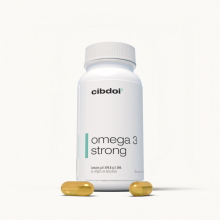Is it Better to Take Omega-3 Before or After Workout?
Published:
Omega-3 fatty acid supplements like fish oil have become hugely popular among fitness enthusiasts and athletes. But questions remain regarding the optimal timing - should you take omega-3s before or after your workout for maximum benefits?
Contents:
This article will examine the evidence on how pre- vs post-workout omega-3 supplementation impacts performance, muscle damage, recovery, and potential mechanisms.

An Overview on Omega-3s
Before analyzing the timing question, let’s first provide context by defining what exactly omega-3s are and why athletes may benefit from optimizing intake:
What are Omega-3s?
Omega-3s are a class of essential polyunsaturated fatty acids that play vital roles in human health. There are three main omega-3s:
- ALA (alpha-linolenic acid) - found in plant foods
- DHA (docosahexaenoic acid) - primarily from fatty fish
- EPA (eicosapentaenoic acid) - also concentrated in seafood
ALA, DHA, and EPA all provide benefits, but EPA and DHA are particularly important for their anti-inflammatory effects.
Why Athletes Use Omega-3 Supplements
Research shows omega-3s like fish oil may provide several performance and recovery benefits for athletes:
- Reduces muscle damage and post-workout soreness
- Decreases inflammatory markers after training
- Improves endurance capacity and oxygen efficiency
- Increases strength and power output
- Optimizes muscle protein synthesis
- Enhances fat burning during exercise
Given these benefits, it’s easy to understand why omega-3 supplementation is so prevalent. But does timing matter to maximize the effects?
Potential Benefits of Pre-Workout Omega-3s
Let’s first explore how taking omega-3s before your workout may be advantageous:
1. Increases Blood Flow to Muscles
Some studies have reported greater vasodilation (expansion of blood vessels) and blood flow to muscles during exercise after taking omega-3s.
Increased delivery of oxygen and nutrients could support energy production and performance. EPA in particular helps vasodilation by boosting nitric oxide.
2. Raises Fat Oxidation
There is evidence that acute pre-workout omega-3 intake shifts substrate preference more towards utilizing fat stores versus glycogen during the impending exercise bout.
One study found just a single 2 gram dose of fish oil increased fat oxidation by 15% during 60 min of moderate cycling exercise performed shortly after supplementation.
3. May Support Reaction Time and Cognition
Findings are mixed, but some studies have shown omega-3 intake shortly before physical or cognitive tasks improves reaction time, processing speed, focus, and mood.
These effects may translate to quicker reactions and heightened concentration during training sessions. More research is still needed on acute pre-workout impacts.
In summary, potential perks of taking omega-3s pre-workout include increased blood flow, heightened fat burning, and perhaps improved cognitive function. But what about post-workout benefits?
Potential Benefits of Post-Workout Omega-3s
Now let’s explore the evidence for benefits associated with consuming omega-3s immediately after training:
1. Reduces Muscle Soreness and Damage
Multiple studies report significantly less muscle soreness in the 1-4 days after intense exercise when fish oil is consumed soon after compared to placebo.
Post-exercise EPA/DHA intake may attenuate inflammatory processes causing delayed onset muscle soreness.
2. Speeds Recovery by Lowering Protein Breakdown
In addition to reduced soreness, omega-3 intake post-workout lessens markers of muscle damage like creatine kinase. It also lowers protein breakdown.
Faster recovery translates to being ready for your next hard training bout sooner.
3. May Augment Muscle Protein Synthesis
While robust data is lacking, it’s hypothesized post-workout EPA/DHA could complement whey protein’s effects on muscle protein synthesis.
This may enhance rebuilding of damaged fibers and maximize the hypertrophic response. But more research is still needed.
In summary, consuming omega-3s shortly after training appears beneficial for mitigating muscle damage, curbing protein breakdown, and potentially enhancing protein synthesis.
Pre vs. Post-Workout: The Verdict
After looking at the evidence for both sides, is there a clear verdict on whether pre- or post-workout is optimal?
The research overall seems to slightly favor post-workout for reducing muscle soreness and accelerating recovery. These effects have been more consistently demonstrated compared to the theoretical performance benefits of pre-workout ingestion.
However, the ideal solution may be utilizing a combination approach:
- Pre-workout: 1-2 grams of EPA/DHA approximately 60-90 minutes before training
- Post-workout: Another 1-2 grams within 60 minutes after completion
This would allow you to reap potential benefits from elevated blood flow, fat oxidation, and cognitive function pre-exercise while also facilitating quicker recovery post-exercise.
Splitting your daily omega-3 dose before and after workouts is anecdotally reported to be beneficial by many athletes and bodybuilders.
Optimizing Omega-3 Absorption
If you do decide to implement a pre/post workout omega-3 strategy, you’ll want to optimize absorption to reap the greatest benefits:
- Take on an empty stomach - avoid high protein, fiber
- Use fish, krill, or algae oil for higher EPA/DHA content
- Start with a moderate 500-1000mg dose and increase over time
- Minimize consumption of processed carbs and sugars
- Stay well hydrated before and after training
Poor digestion and gastrointestinal distress can impair absorption and undermine any timing benefits.
Additional Diet and Lifestyle Factors
While optimizing omega-3 intake may provide performance and recovery advantages, many other diet and lifestyle strategies have larger effects. Some best practices include:
- Eating Sufficient Calories and Macronutrients
Make sure your total daily nutrition provides enough energy and building blocks to support your training demands. Get adequate healthy fats, quality proteins, and micronutrients.
- Hydrating Properly
Drink plenty of non-caloric fluids before, during, and after training to avoid dehydration which can hinder performance and recovery.
- Prioritizing Sleep
Good sleep quality and duration is essential for replenishing energy stores, regulating hormones, and facilitating muscle repair.
- Allowing Rest and Recovery
Don’t overtrain. Provide muscles at least 1-2 days of lower intensity training or complete rest between intense sessions.
- Mitigating Life Stressors
Excess physical, mental, emotional, or occupational stress takes a toll on the body and recovery capacity. Develop healthy stress management habits.
While optimizing omega-3 intake can provide benefits, it is just one piece of the big picture. Addressing these other factors is arguably even more important.
Conclusion
To summarize the key points:
- Omega-3s like EPA and DHA from fish oil may offer both pre-workout and post-workout benefits
- Post-workout consumption appears most beneficial for reducing muscle damage and speeding recovery
- Pre-workout intake provides theoretical benefits for increased blood flow and fat oxidation
- An ideal strategy may be taking a moderate 1-2 gram dose both before and after training
- Optimize absorption by taking on an empty stomach with water and minimal processed carbs
- A comprehensive approach also requires proper nutrition, hydration, sleep, stress control, and recovery management
While research overall supports post-workout consumption, a split pre/post workout approach may provide maximum results. Give it a try yourself and see if you notice measurable benefits in performance, recovery, and muscle gains over time.










